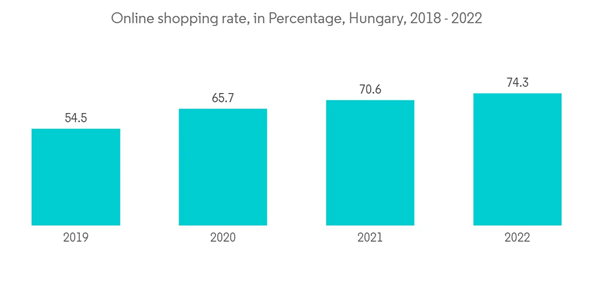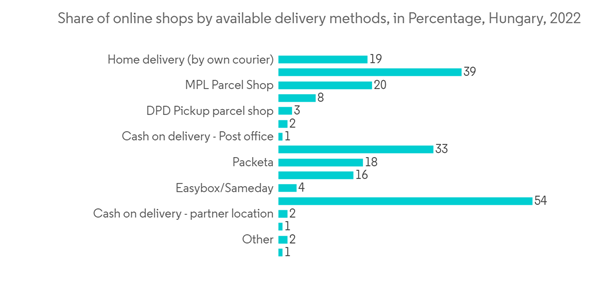Key Highlights
- The wholesale and retail sectors remain among the most significant pillars of the Hungarian economy. But due to COVID 19 and the subsequent restrictions, both sectors have been the hardest hit. However, the COVID-19 pandemic created a demand for contactless payments, enhancing the total need for POS terminals equipped with NFC, RFID, and other technologies accepting payments from contactless chip cards or digital interface cards.
- The rise in online shoppers is one of the pivotal factors augmenting the total market in Hungary. For instance, as per the Hungarian Central Statistical Office, the total share of online shoppers grew significantly in Hungary. Last year, the overall share of people shopping online reached nearly 74.3%.
- Furthermore, the total share of urban population in Hungary is huge and growing year-on-year. As per World Bank, last year, 72.25% of Hungary's total population lived in urban areas and cities, whereas in 2020, 71.94% of Hungary's total population lived in urban areas and cities. This shows a greater degree of urbanization in Hungary, which acts as one of the key drivers of the market that will positively impact its market growth.
- Moreover, Hungary's overall share of individuals using the internet to sell goods or services has risen significantly in the last few years. According to Eurostat, households accessing the internet increased to 93% in the previous year. This rise in the overall usage of the internet to sell goods or services by individuals in Hungary will boost the Hungary POS terminal market and is expected to create ample opportunities in the upcoming days.
- On the other hand, the steady growth in security concerns due to the usage of critical information while using the POS terminal could be a factor that can stifle the market growth in Hungary.
Hungary POS Terminal Market Trends
The Rise in the Total Number of Payment Transactions in Hungary
- The digitalization of payments has accelerated the move to cashless transactions. Even before COVID-19, contactless payments were on an upwards trajectory, facilitating a shift toward cashless countries. Although cash is still a popular means of payment in Hungary, the data for the previous year shows that debit cards are playing an increasingly major role in the lives of Hungarians when they decide to spend their money. This significant change is mainly due to the COVID-19 pandemic.
- In the previous year, Hungarians started to gravitate toward debit card purchases a lot more; never before have so many card purchases been made in Hungary than in the third quarter of the same year. Between July and September, 322 million transactions were made with domestically issued debit cards. This is 40 million or almost 15% more than in the previous quarter, which saw the highest number of card purchases in Hungary, based on data from the National Bank of Hungary (MNB).
- According to GKI digital, in the previous year, one-third of online orders were paid using a card upon delivery. Another 31% of the packages were paid for through electronic payment methods. This shows that the people in Hungary are very likely to pay through cards or by electronic payment methods, which is a positive indication of the market's growth in the region.
- Moreover, the rise in the number of e-commerce transactions in Hungary is vital in augmenting market growth. According to GKI digital data, in the last year, the total number of e-commerce transactions reached nearly 69 million in Hungary. The most online purchases were made in the apparel, fashion, and sports products categories totaling over 14 million.
- As per Hungarian Central Statistical Office, in the last year, the share of online shopping grew to 74.3%, whereas it was only 70.6% the year before that. This rise in online shopping will enhance the market growth exponentially.
Rise of Retail Trade in Hungary
- An increase in the total percentage of enterprises that sell online in the country is acting as a catalyst for market growth.
- In addition, the online share of the retail trade turnover in Hungary is in the rising phase. The share of the total retail trade revenue increased considerably in Hungary due to the COVID-19 outbreak. Based on the data from GKI digital, in 2021, e-commerce accounted for over 10% of online retail turnover. This rise in Hungary's total retail trade revenue is a positive indication of market growth.
- Moreover, per the data from Eurostat, the total percentage of e-commerce as a proportion of the total turnover of enterprises in Hungary in the last decade has risen. Last year, the turnover share from e-commerce for business enterprises totaled 21% in Hungary. Additionally, the turnover share from e-commerce for business enterprises is expected to grow primarily due to the rising trend of payment transactions prevailing in the country.
- Also, as per GKI digital, Hungary's total number of online orders followed an increasing trend over time. Last year, domestic online orders peaked at almost 70 million. This rise in domestic online orders will significantly boost the market's growth.
- Furthermore, with the growing popularity of e-commerce, online retail trade revenue has increased year over year in Hungary. In 2021, revenues from online retail totaled USD 3.2 Billion, per GKI digital data.
Hungary POS Terminal Market Competitor Analysis
Due to the existence of a few players, the Hungary POS Terminal Market is slightly fragmented. Moreover, because of the partnerships and recent advancements in the market, the sector is characterized by moderate competition. Worldline SA, Paymentwall Inc., and Novopayment, among other companies, are some of the prominent participants in the field.In January 2022, Worldline collaborated with Spreedly, the provider of the leading Payment Orchestration platform, and announced that Worldline had joined the Spreedly Payment Service Provider Program. Spreedly’s Partnership Program was created to further support a vision for a diversified and inclusive payments ecosystem by offering connectivity and flexibility for all players, including payment service providers.
Additional benefits of purchasing the report:
- The market estimate (ME) sheet in Excel format
- 3 months of analyst support
This product will be delivered within 2 business days.
Table of Contents
Companies Mentioned (Partial List)
A selection of companies mentioned in this report includes, but is not limited to:
- Worldline SA
- eService Sp. z o.o.
- Novopayment
- Quadrapay
- SRS Informatika Kft.
- myPOS
- B-Payment Szolgáltató Zrt.
- Ingenico
- Fizetési Pont
- Bartimex Kft.










